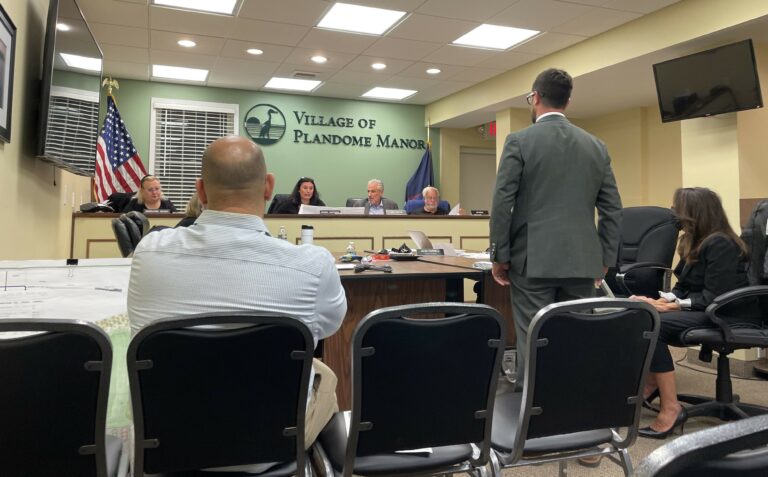
The Village of Plandome Manor’s Design Review Board gave the green light to Islander Bo Horvat’s landscaping plans for his new property on Plandome Road last Thursday after an hour of public comments all in opposition to the plans.
The Horvat family was absent from the proceedings.
The landscaping proposal involved the installation of green giants and boxwoods around the property on Plandome Road bordering Leeds Pond as well as perennials, as mandated by the Department of Environmental Conservation.
The presence of green giants at the front of the property was proposed to enhance privacy, although the exact height of these trees could not be described to the board by Scott Tyrone, who displayed a mock-up of the planting plans and types of plants suggested by Sivilli Landscaping Contracting.
Despite an initial readiness by the board to vote on the landscaping plans after 10 minutes of hearing the design, the audience asked the board to be heard. There was a miscommunication with the board, which did not realize that members of the public wanted to speak.
Village counsel John Farrell emphasized that the board’s jurisdiction was limited solely to architectural and landscape matters, excluding any discussions related to Leeds Pond’s impact.
Horvat, a New York Islanders hockey player, and his wife are currently named in a lawsuit filed in Nassau County Supreme Court over a landfill decision on their Plandome Road that could potentially harm Leeds Pond. The lawsuit application claims that qualified experts have raised concerns about the potential harm to Leeds Pond caused by the substantial landfill.
The Board of Zoning Appeals allegedly approved the deposit of 350 cubic yards of landfill in Leeds Pond, which is a stark violation of the Village’s zoning laws. The lawsuit was filed on behalf of Eastern LLC, the owner of property around Leeds Pond, who is seeking a reversal of the recent decision.
The issue has raised concerns about the preservation of Leeds Pond, which is a 22-acre fresh body of water in Plandome Manor and a essential part of the surrounding ecosystem
“The board is only considering a landscaping plan tonight,” Farrell said. “We’re not going to hear testimony about any impact on Leeds Pond. This board has very limited jurisdiction. The jurisdiction is the architecture and the landscape. It has nothing to do with anything that was approved by the zoning board. So, if that’s the intent of the opposition, you’re wasting your time because it’s not going to be considered by the board.”
Despite the restrictive scope, numerous attendees voiced their concerns about the broader ecological impact of landscaping decisions, including those beyond the board’s purview.
Frank Piccininni, co-founder and partner at SMPIL Consulting, said he did not know how to talk about landscaping without mentioning the grade and drain.
“The mandate of the board…is to promote the public health, safety, welfare and conserve the value of buildings to encourage the most appropriate use of the land. And to improve the physical and visual appearance of the village. There’s nothing more important from my standpoint as an environmentalist and an ecologist than the actual visual appearance of the pond.”
The issue of potential flooding of the pond was raised.
Piccininni said if there is a flooding issue, it will lead to neighbors putting more site fill to move the flooding off of their property and shift it elsewhere.
“The only thing that is really the only remedy left is an arms race with your neighbor,” he said to the board. “So if your neighbor dumps 500 yards next to you, the only thing that you can do is dump another 780 yards on that still land and then all of that goes into the pond.”
Piccininni also said that there is a larger village problem that has become “a pattern of behavior here. It’s about asking for forgiveness instead of permission.”
Board member Semiramis Geiger had a question for those opposed to the design asking why this project in particular had people speaking out when in recent years they’ve made decisions regarding houses near or next to Leeds Pond that weren’t challenged.
Margaret Galbraith said she wished she had the time to go to every hearing but because of climate change, flooding concerns and overall environmental concerns she was there now.
“There has to be a change in the paradigm,” Galbraith said. She pointed out that native trees were cut down that would have helped with flooding but boxwoods “don’t cut it.”
She advocated for native plants to be used instead, a sentiment shared by Piccininni who called the current plants on the plans “Home Depot specials.”
“Frankly,” Galbraith said, “somebody has to start dealing with the environment because it’s not going to be pretty, Leeds Pond will not be pretty…so I do think the landscaping board has to think a little wider. I wish the BCA thought a little more about it.”






